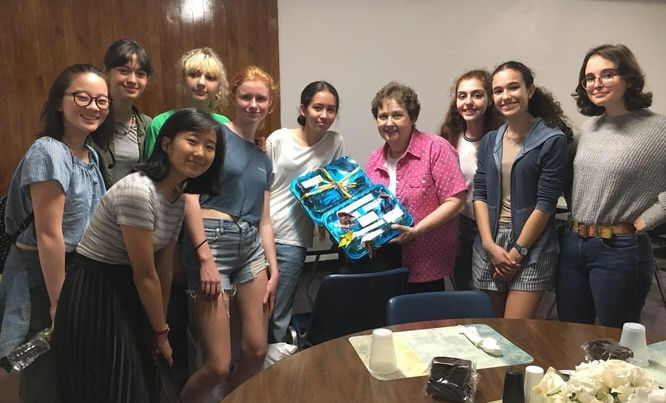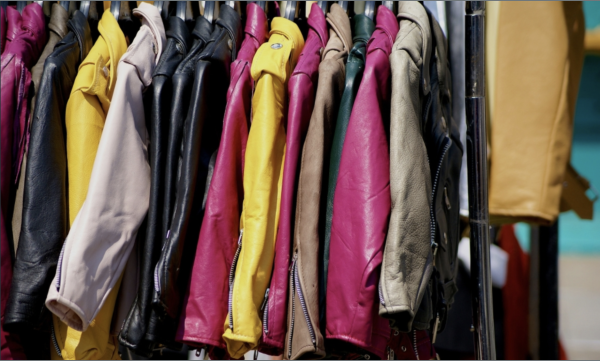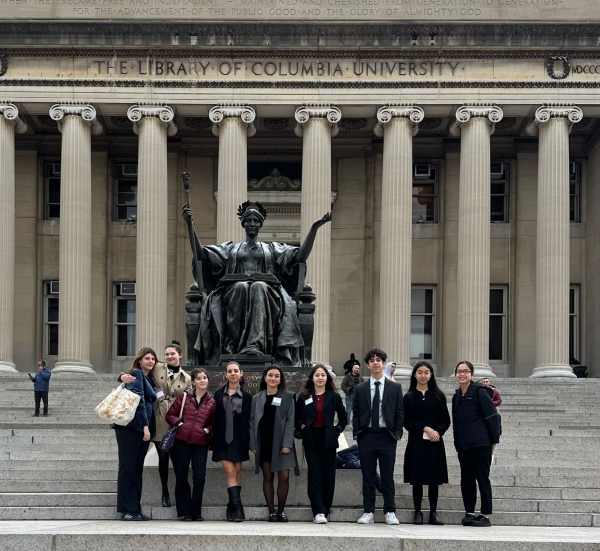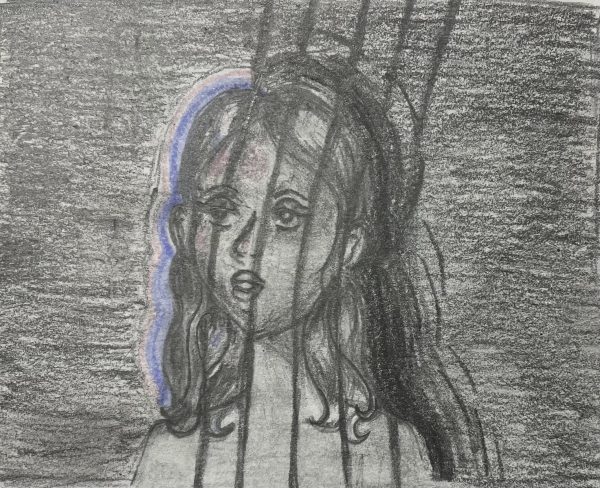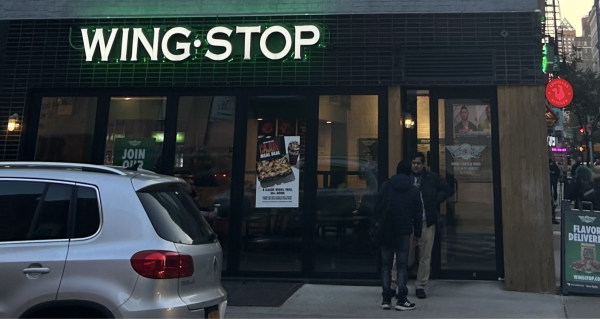(In)visible Women Club Spotlight
An interview with Madi Aye and Tierra Kobayashi, who been in the club since it was founded.
- Why did you join (In)visible women?
Madi: I was part of the original club Invisible, it was for the entire population of homeless people of New York City. But one of our peers decided to make it to specifically target women homeless population in New York, and she asked us if we wanted to join. I said yes because I also think it’s a pretty prevalent issue that comes up in New York. It’s been in New York for a while now.
Tierra: I joined because I think it’s an important issue that some women don’t feel safe in the shelters that are co-ed. They refuse to go. I feel as though it’s important that they feel safe. It’s something that we can help with (I’m happy to do that).
- How long have you been in the club?
Tierra: Since it was founded last year.
Madi: Since tut one.
- What have you learned from the club?
Madi: In my position in the club, I’ve learned some leadership skills I guess. We’re in charging of managing a few people and since I’m a part of the finance and of budget department, I’ve also learned how to communicate with people in higher positions, like Mr. Baha.
An interview with Sophie Hafter, Pablo Martin, and Julia
- What grade are you in?
Sophie Hafter: I’m in T2
Julia: I’m in Tut 3
Pablo: T2
- Why did you join (In)visible women?
Sophie Hafter: Originally I joined just because it was the majority of my friend group, but as the year continued (I joined last year). (This sounds cheesy), but I kind of found a passion for supporting these women, and fundraising, and doing all the stuff we do in (In)visible.
Julia: Mostly because I had a lot of friends in it, but also because I wanted to contribute to something in the local community.
Pablo: Because I need community service.
- How long have you been in the club?
Julia: Since this year.
Pablo: Since the beginning of the year.
- What have you learned from the club?
Sophie Hafte: I’ve learned that fundraising takes a lot more effort and money and preparation that I realized, especially with the things that we’ve done such as the waffle sale and the crepe sale. We were running around to a bunch of different stores in the area trying to find supplies.
Julia: I learned that collaboration and generosity, through those we can make a difference in the world. In a smaller community and in larger and broader groups.
- What was something that struck you as important?
Julia: Definitely collaboration cuz everyone has their own role. Everyone has a specific task, that it all comes together and makes a bigger product.
Sophie Hafter: I think just raising awareness about homelessness in New York. A lot of people don’t give any attention to the people on the streets, but, in reality, they really do need attention and support from everyone else. They all deserve a home.
- Should other people join the club, if so why?
Sophie Hafter: Definitely, because we’re always looking to expand.
Pablo joked: “No, we’ve actually got too many people. So don’t join the club. We don’t have enough space.”
Julia: Other people should definitely join the club if they want to contribute to the city that they live in and if they want to give back. If they want to thank the place that live for all that they’ve given them.
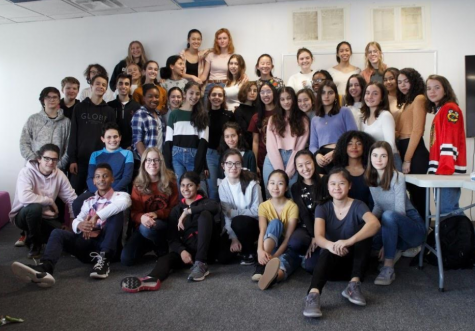
- (To Julia) What do you mean by thanking the place that they live in?
Julia: I feel like I don’t want to make any assumptions but I feel like people who go to UNIS have a certain amount of privilege, not just because you can afford, but also because it’s a really world-class education and unique environment. It’s the most diverse high school in the country. So I think people need to appreciate these things, and the best way to that to do that is to acknowledge people to have less privilege – and sort of help them out in any way you can.
- What was the best event that you partook in? Why?
Sophie Hafter: The best event was probably the Dwelling Place annual fall gala.
Pablo: Well, I only partook in one (the hot chocolate selling), and that was fun and I got community service.
An interview with Kristen Meola
- Why did you start the (In)visible Women club?
In M3, which is 7th grade my English teacher and homeroom teacher, Ms. Ginavascuve decided that our class should start a community service effort. We chose to go to Gauder Riverside community service center, which is a homeless shelter in Manhattan. Then at the end of the year, we had a storytelling event where we invited people to come and talk about what home meant to them. We rented out the Nuyorican Poets Cafe and we invited teachers and parents and professional storytellers to gather and to tell of a story of what the meaning of home was. All of the proceeds went to making move-in kits, which we gave to newcomers to the shelter. After that year (in M4) I realized that it really was my passion and that I wanted to continue that into high school. So over the summer, I found the Dwelling Place, which is ìs a transitional all women shelter in Manhattan as well. I contacted them and they talked to me about the specific issues that affect females in homelessness. I decided that I wanted to tell our community about it, and this was the best way that I could think of.
- If you could do anything differently to improve the club what would it be?
Probably more awareness campaigns because I feel like although we raise money, our club should work towards also alerting our community or alerting New York and our society that females and solitary women in homelessness face so many challenges that aren’t addressed and that we as students are able to improve.
- Can you give an example of what challenges these women face?
Sure. Well mainly there’s domestic abuse; a lot of them are fleeing dangerous households. They have children and they need to work on supporting their child but also juggle that with having a job. Then there’s what’s called job discrimination, which is when a woman will be turned down from work because she is assumed to be irresponsible because of the stigma surrounding homelessness or because she won’t be able to work as hard because she has a family to support as well. And because of that, so many women end up in the cycle of homelessness. It’s so difficult for them to get out without the help of transitional shelters like the Dwelling Place.
- What is the most difficult part or task that you have to fulfill as a club leader?
The most difficult is probably determining what the most effective means of fundraising are for our club. For example, I always want to know that all of our hard work will be able to yield something that will be effective in helping these women. It’s a balance between funds and awareness which I am still trying to find that right point.
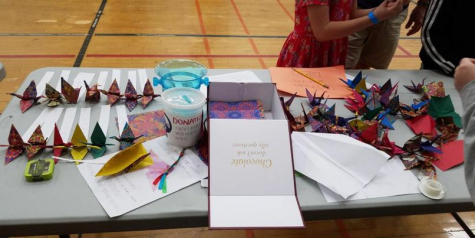
- What inspires you about the Dwelling Place, if it does?
It inspires me because the women who have worked there, have worked there for many decades and they’ve seen so many different types of people coming in out of the shelters, and I’ve actually met some of the women who are residents or who were former residents myself. The stories that they have to tell about their lives and the way that they describe homelessness and their struggles is so important to be understood by the public. The Dwelling Place does a really good job of ensuring maximum safety for the women.
- Do you know where the funds that the (In)visible women club raised go into specifically?
Last year they went into heating the building because it was winter and it was really cold, and it’s important that everyone in the shelter stays warm and is able to have òoght and technology and be able to then find jobs or even like live with the bare necessities. This year we’re focusing on paying the salary of case managers. There are two who live in at Dwelling Place, and they focus on each individual woman. They learn what that woman needs to follow her dream, and work with that woman on they can achieve that. I think that’s so important, especially when you think about mental health as the factor at the shelter that the women need to work on and improve before they’re able to then go and live the life that they want to.
- Were you familiar with the Dwelling Place before you started the (In)visible Women club at UNIS?
Yes, I found them on the internet and I was able to visit over the summer, and I realized that they were a shelter that I wanted to support, and they inspire me every day to keep working with our club. So they are the reason that this club is existing right now.
- What has the club achieved?
I think last year we were 12 members and this year we’re 56 I believe. Because our club grew so much over the year, I think that means that our message spread among the school and among the students.
At first, when I joined the (In)visible women club, I didn’t know the history behind it or what its core purpose was. I was more interested in finding out about the Dwelling Place and still did not understand the significance of the club fundraising. (As Anonymous said, “donations are always good”). The members of the club are dedicated to the club and truly believe in its values. This club is making a real difference to the lives of homeless women in our community. So whether you want to join the (In)visible Women club for community service, or are not completely active in the club you can always find a way to help lift others. It’s easy to walk down a street engrossed in our own problems and become oblivious to people around us. I’ve done it countless times. Abuse, mental health, and the cycle of poverty are hard to fathom when you pass an ordinary woman on the street, but homelessness is more than what meets the eye.



